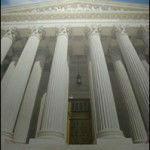 For the second time in modern history, the Senate Judiciary Committee has rejected the Governor’s nominee to the New Jersey Supreme Court by a vote of 7-6 after a hearing lasting approximately five hours. New Jersey lawyer Bruce Harris would have made history as the court’s first openly gay member of the court. Instead, he has become part of the history of the first major fight to maintain the bipartisan balance of court since the New Jersey Constitution of 1947.
For the second time in modern history, the Senate Judiciary Committee has rejected the Governor’s nominee to the New Jersey Supreme Court by a vote of 7-6 after a hearing lasting approximately five hours. New Jersey lawyer Bruce Harris would have made history as the court’s first openly gay member of the court. Instead, he has become part of the history of the first major fight to maintain the bipartisan balance of court since the New Jersey Constitution of 1947.
New Jersey lawyers and political observers are confused about why a nominee would proceed with a public hearing when everyone knew he did not have the votes for confirmation. Some blame the Governor’s aggressive style while others blame the Judicial and Prosecutorial Appointments Committee (JPAC).
Although Harris received the approval of the New Jersey State Bar Association, his credentials have been questioned every step of the way. Now the impartiality of the JPAC’s members is being questioned as well as the value of JPAC’s review itself. While that committee sometimes rejects well qualified judicial nominees on the basis of their lack of trial experience, they approved Harris, the Chatham Borough mayor who has spent most of his legal career as a transactional attorney and lacks any measurable courtroom experience.
Ultimately, all seven lawmakers who voted against Harris cited his lack of experience as their justification. “Nothing in today’s hearing … suggests you do have the requisite skill set,” said Chairman Nicholas Scutari.
Sen. Linda Greenstein, D-Middlesex, explained, “We should be searching for the cream of the legal crop.”
Republicans, meanwhile, characterized the decision as purely political. “There has never been a litmus test” that required a candidate for the Supreme Court to have experience in the courtroom, said Gov. Christie. “There has to be a certain temperament and intellect,” he added. “None of that actually mattered when it came to Bruce Harris. The only thing that matters was politics.”
Regardless of anyone’s view of who is on the side of the angels in this debate, the one thing that is certain is that the outcome of this battle will ultimately determine more than the political balance of the NJ Supreme Court. It will determine whether the tradition of judicial nonpartisanship that has been the hallmark of the New Jersey Judiciary since the Constitution of 1947 will continue or whether a new precedent will be set for future Governors to eliminate the need to consider political balance at all. For the New Jersey State Bar Association, their continued role in the judicial nomination process depends upon the perception of fairness and consistency in the method and criteria they use to review candidates.
